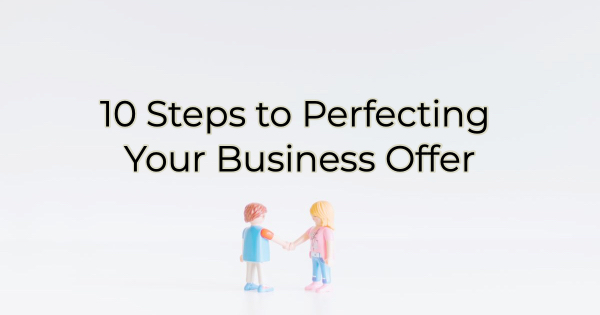
Ever notice how some offers are irresistible? You didn’t even know you needed the product or service. Then you saw the offer, and BANG!, you’re whipping out your credit card. This isn’t by accident. Someone down the line carefully created the offer that caused you to act with wild abandon. And you can do it too for your business. It just takes a little forethought.
Steps to Perfecting Your Business Offer
Go through the steps of the following list to help you perfect your business offer.
- Get to know your recipient. Who is the offer for? What do they need most? What do they care about? What’s their hot button that when you say that word or phrase they’ll listen?
- Limit your offers. If you have too many things out there, your customer will have analysis paralysis. 1-2 strong, targeted offers are better than 5 broad ones. Don’t worry about reaching everyone. You want to design an offer (or two) for people most likely to buy from you.
- Be clear. A confusing offer is not something someone acts on. Run your offer by several people in your target market. Do they understand what you’re offering and what they’ll receive? They can’t decide if they don’t know what it is they’ll get. Clarity evokes action.
- Provide clear benefit. No potential customer is going to waste any brain power thinking about how your offer can help them. Be very clear about how they will benefit from your offer.
- Help your customer know why you are the obvious choice. In most circumstances, you have competition. Understand why you are the best business to buy from (according to your customers). Use something that makes an impression. For instance, great customer service is not enough of a purchase driver. That’s an expectation. Offering a 100% money-back guarantee for 30 days is more likely to overcome indecision.
- Decide if there’s a better way. An offer doesn’t have to be a discount. It can be a free trial, a sampling, or a special bundle price. Review your current offer—or if you don’t have one—think about things that are commonly purchased together or consider how you might give your customer more value.
- Review your business marketing. Assuming your offer is for all customers and not just existing ones, it’s also a good time to review your website and other marketing. Is it clear what you do and for whom? A great offer coming from a business with a convoluted message of what they do will not inspire action.
- Go for the emotional appeal. A good business offer evokes emotion even when the product isn’t traditionally appealing. For instance, a plumber might run a “Family in Town for the Holidays” offer to get pipes up to par before the big day. Mentioning family and the holiday immediately brings on a flurry of emotions and helps the potential customer realize this is something they should do sooner rather than later.
- Make it easy to say yes. If someone sees an offer that interests them, you don’t want to give them any reason to reconsider. A slow website, too many page redirects, too much info required…these are all things that slow down the buying process and can make people abandon purchases. The same is true of your brick-and-mortar store. A lack of available salespeople, long lines, tight quarters, or an unappealing buying experience can all cause people to forget purchases and go elsewhere.
- Stay connected. People you sell to once are more apt to buy from you in the future. After they take you up on your offer, stay in touch. Give them a reason to stay connected (future deals work well). Build an email list for easier future marketing. Make an internal note about the offer they responded to and use that in the future to craft an even more appealing call to action for them.
